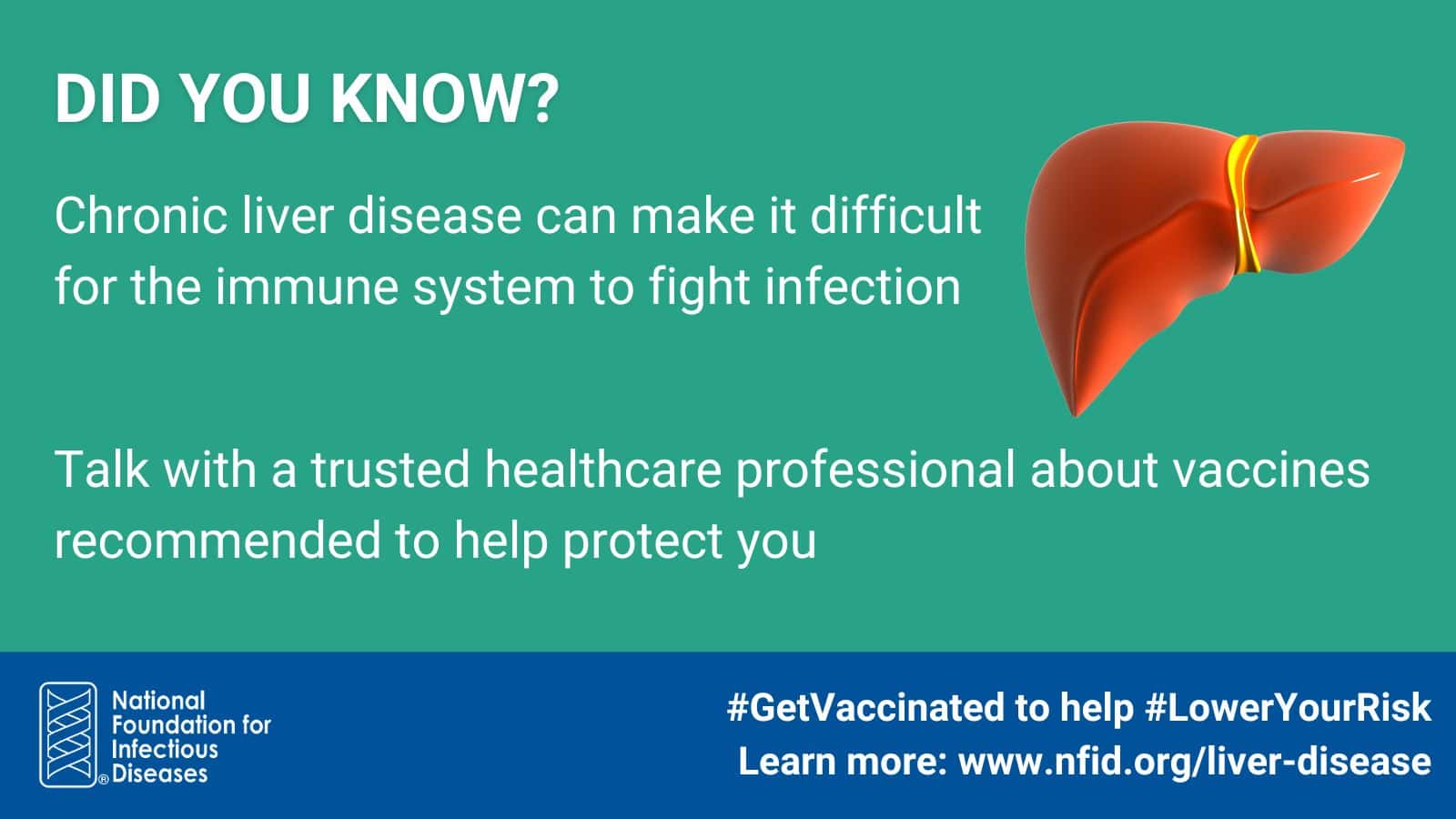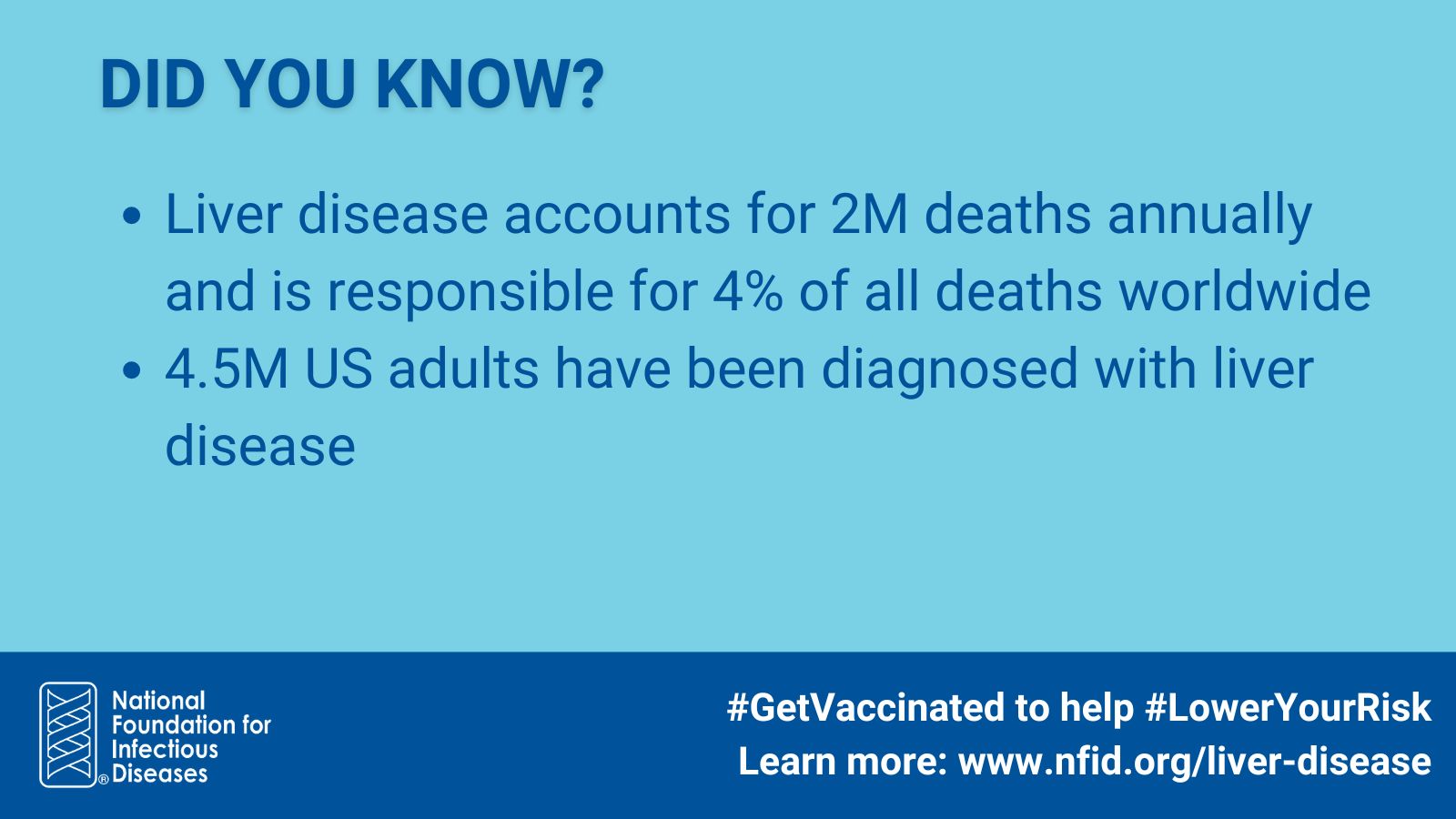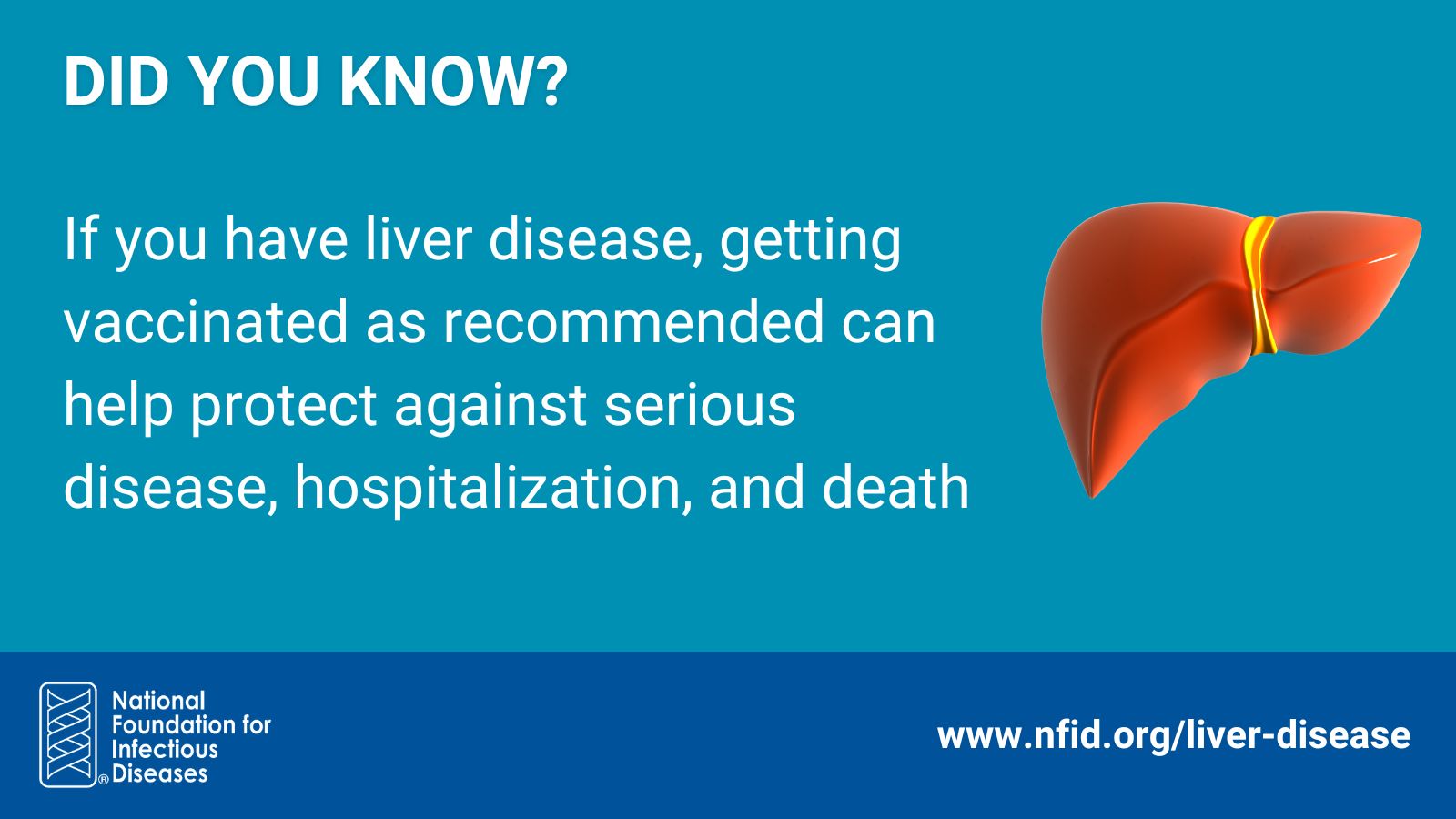 If you have liver disease, staying up to date with recommended vaccines can help protect your health.
If you have liver disease, staying up to date with recommended vaccines can help protect your health.
For those with chronic liver disease, getting an infection can cause serious liver damage and can make it difficult for the liver to function properly. An infection can lead to cirrhosis—a severe scarring of the liver that can be life-threatening.
Vaccination is safe and can help protect against serious disease and related complications that can lead to hospitalization and even death.
If you are a liver transplant recipient, vaccines can help protect you from preventable diseases which is important because the immune suppression required to protect your transplant increases your risk for infection. Most vaccines are safe and effective, but you should talk with a trusted healthcare professional before getting vaccinated because live virus vaccines should not be given to liver transplant recipients and others who are immunocompromised.
Share these social media graphics to help raise awareness:
What Vaccines Do People with Liver Disease Need?
The Centers for Disease Control and Prevention (CDC) recommends the following vaccines for people with liver disease:
COVID-19
Everyone age 6 months and older should stay up to date on COVID-19 vaccines.
People who have liver disease, especially those with cirrhosis, are more likely to die from COVID-19.
Transplant recipients and others who are moderately or severely immunocompromised may need additional doses of COVID-19 vaccines. Monoclonal antibodies also can help prevent COVID-19 infection in those whose immune systems are too weak to benefit from a COVID-19 vaccine.
Talk with a trusted healthcare professional about whether vaccines or monoclonal antibodies are recommended to help protect you against COVID-19.
Flu (Influenza)
Everyone age 6 months and older should get vaccinated against flu every year.
If you have cirrhosis, getting infected with flu puts you at higher risk of developing severe related complications including death. A study conducted during a serious flu outbreak in Germany found that flu infection could trigger liver failure in patients with cirrhosis. Another study found that people with chronic liver disease who got vaccinated against flu were 27% less likely to be admitted to a hospital.
There are several types of flu vaccines, most of which are safe and effective in people with liver disease, including those who have had a liver transplant. But, transplant recipients and others who are immunocompromised should not receive a nasal flu vaccine because it contains live (weakened) influenza viruses.
Hepatitis A
People who have liver disease have a greater risk of serious complications from hepatitis A. Those with chronic liver disease, including those who have hepatitis B or hepatitis C, should be vaccinated against hepatitis A.
Hepatitis B
Vaccination is the best way to prevent hepatitis B infection and potential complications, including liver cancer. Hepatitis B vaccination is recommended for people who have hepatitis C or other causes of chronic liver disease. All adults should be tested for hepatitis B infection at least once, and everyone in the US between age 19-59 years should be vaccinated against hepatitis B.
Pneumococcal Disease
Pneumococcal disease is caused by bacteria that can attack different parts of the body and can cause pneumonia (lung infection), bacteremia (blood infection), and meningitis (infection of the lining of the brain and spinal cord).
People with chronic liver disease are twice as likely to develop invasive pneumococcal disease and are more likely to be hospitalized or die due to pneumococcal disease than the general population.
Pneumococcal vaccination is recommended for:
- Children younger than age 5 years
- Adults age 50 years and older
- Individuals with certain chronic health conditions or other risk factors, including those with liver disease
Tetanus, Diphtheria, Pertussis
Everyone age 2 months and older should be vaccinated against tetanus, diphtheria, and pertussis (whooping cough). In the US, most infants receive a combined vaccine called DTaP (diphtheria-tetanus-acellular pertussis). Adults, older children, and adolescents should receive a booster of the combination vaccine, Tdap (tetanus-diphtheria-acellular pertussis) or Td (tetanus-diphtheria), every 10 years. Pregnant women should also receive a dose of Tdap vaccine during each pregnancy.
These combination vaccines protect against 3 potentially serious diseases:
- Tetanus can cause severe muscle spasms, leading to “locking” of the jaw, making it hard to open the mouth or swallow, and in severe cases, tetanus infections can lead to death
- Diphtheria can lead to breathing problems, heart failure, paralysis, and sometimes death
- Pertussis (whooping cough) can cause coughing spells that are so severe that it can be hard to breathe, sleep, or eat, and can be deadly for infants.
Other Vaccines You May Need
Talk with a trusted healthcare professional about other vaccines you may need, depending on your age and other factors. Note that those who are immunocompromised, including liver transplant recipients, should not receive any vaccine that contains live (weakened) viruses.
If your healthcare professional does not offer the vaccines you need, ask for a referral to ensure you get all the vaccines recommended for you.
Updated October 2024
Sources: Centers for Disease Control and Prevention, American Liver Foundation



